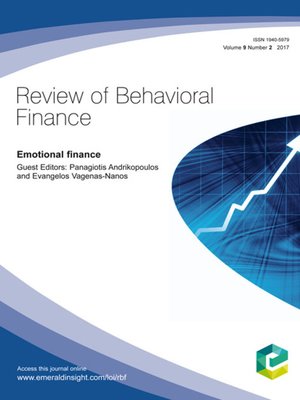Review of Behavioral Finance, Volume 9, Number 2
ebook ∣ Emotional Finance · Review of Behavioral Finance
By Robert Hudson

Sign up to save your library
With an OverDrive account, you can save your favorite libraries for at-a-glance information about availability. Find out more about OverDrive accounts.
Find this title in Libby, the library reading app by OverDrive.



Search for a digital library with this title
Title found at these libraries:
| Loading... |
Traditional neoclassical finance assumes that individuals make decisions in an attempt to maximize their personal utility function given a number of constraints. One of the unrealistic assumptions of neoclassical models is that such individuals are fully rational as dictated by the standard Bayesian probabilistic framework. However, in reality, investors hardly ever make decisions under conditions of perfect information and information is not always processed without cognitive or emotional biases.Behavioural finance challenges the idea that investors are fully rational. Cognitive errors such as miscalculations, misunderstanding of data, memory errors and effects such as framing, the endowment effect, confirmation bias, gambler's fallacy and status quo bias are borrowed from psychological studies to explain human decision making for financial matters.However, research has shown that apart from the aspect of cognition, an individual's decision making process is also greatly affected by his/her emotions and feelings. Emotional finance is a new paradigm in the understanding of investment activity by incorporating emotions in financial decision making. It is different from traditional finance theory which assumes investor rationality. It also differs from behavioural finance which may assume that individuals may not be fully rational but they can learn from experience and revert to rationality. Emotional finance argues that human beings are inherently irrational and to a great extent emotions drive their actions and decisions. Emotions such as anger, fear, shame, regret, joy, greed are closely linked with financial investments. Individuals can be either consciously aware and, more importantly, emotions which are unconscious have a much more powerful effect. To that respect, recent work in the field of neuroscience claims that the vast majority of our mental activity is unconscious; while, the presence of powerful emotions during the financial decision making affects not only investors' cognitive functions but also their physiology, e.g. skin conductance and cardiovascular effect due to elevated stress, impact on the anterior insular cortex of the human brain due to aversive visual stimuli and anxiety anticipation.In recent years, there has been growing empirical evidence of the impact of emotions on financial markets. Capturing emotions empirically is a challenging task with some of the most recent studies utilising a range of proxies such as expressions on social networks, hospital admissions, weather or sports results, etc. (Nofer and Hinz, 2015; Engelberg and Parsons, 2016; Strauß et al., 2016; Siganos et al., 2017). The ebook on emotional finance is another attempt to motivate and gather studies that show the impact of emotions in financial markets.






